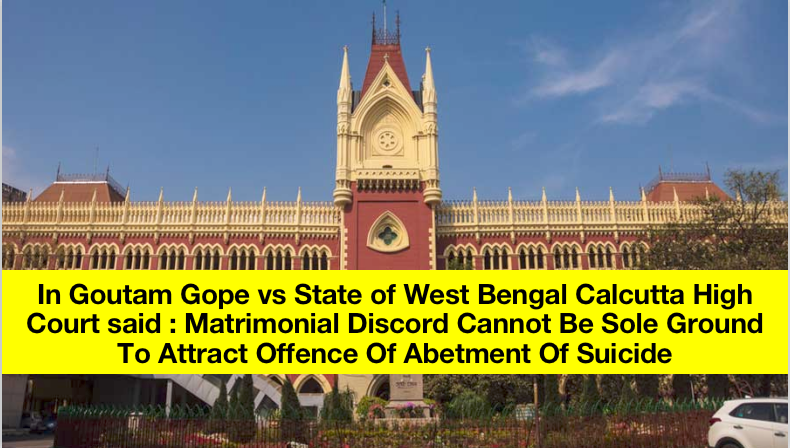
[Goutam Gope vs State of West Bengal]
The Calcutta High Court ruled on Wednesday that a husband’s involvement in his wife’s death cannot be based solely on their marital conflict.
Justice Rai Chattopadhyay, who was the sole judge, released a man and his mother who had previously been found guilty by the lower court for assisting in the suicide of the man’s wife and for committing cruelty towards her, as per sections 306 and 498A respectively of the Indian Penal Code.
The bench stated that in regards to the charge under section 498A of the Indian Penal Code, the accusations of mistreatment against the appellants must be severe enough to suggest that it caused the victim to take her own life. However, the court did not find sufficient evidence to support the guilt of the accused individuals.
Furthermore, the bench emphasized that simply having issues within a marriage cannot be used as a basis for holding the husband responsible for encouraging the suicide.
The appeal filed by Goutam Gope and his mother was being considered by the court, challenging their conviction by a trial court in August 2011. The prosecution alleged that Gope and the deceased were married in July 2006, and that the wife set herself on fire and died in August 2008. The father of the deceased claimed that there were illegal demands for furniture, a color TV, a motorbike, and even cash, and that these demands were fulfilled despite his daughter being subjected to physical and mental torture.
The trial court found the appellants guilty on the grounds that they did not attempt to save the deceased from the fire, and concluded that a woman with an infant child would not commit suicide. The appellants appealed to the High Court, claiming that the fire was accidental, and that the case was filed as a counterblast by the victim’s father. The High Court bench held that merely mentioning the victim’s grievance regarding torture inflicted by the appellants would not be considered abetment of her suicide unless it could be shown that the suicide was the direct result of the appellants’ instigation.
The bench concluded that the trial court had made an error in its ruling, and quashed the conviction order.
The advocates Sibangi Chattopadhyay and Sruti Dey appeared as Amicus Curaie, while the advocates Bibaswan Bhattacharya and Sanjib Kumar Dawn appeared for the appellants.
Written by Rishav Raj Bba. llb (RNB GLOBAL UNIVERSITY) 4TH Semester




0 Comments